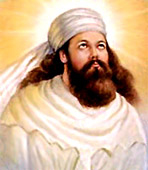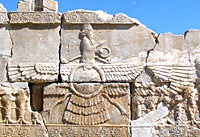 Around 6000 BCE an Iranian Prophet called Zarathustra founded the religion called Zoroastrianism. Due to the invasion of Arabs and the destruction of the Iranian libraries, there are no reliable sources available to indicate the time Zarathustra lived, nor there is any detailed information about the place where he worked. Therefore, it can be said that in the past some researchers would believe that Zarathustra has been living about six hundred to one thousand years before the Christ. However, today some other researchers estimate the life of Zarathustra up to four thousand years before the birth of Christ.
Around 6000 BCE an Iranian Prophet called Zarathustra founded the religion called Zoroastrianism. Due to the invasion of Arabs and the destruction of the Iranian libraries, there are no reliable sources available to indicate the time Zarathustra lived, nor there is any detailed information about the place where he worked. Therefore, it can be said that in the past some researchers would believe that Zarathustra has been living about six hundred to one thousand years before the Christ. However, today some other researchers estimate the life of Zarathustra up to four thousand years before the birth of Christ.
It can be deduced from Gatha, the Divine Songs of Zarathustra, written by him that since he was persecuted by some of his contemporary theologians and religious traders, he escaped his birthplace and appealed to one of the sovereigns of his time, called King Goshtasb. The king was impressed by Zarathustra`s teachings and followed him.
 There are several conflicting stories about Zarathustra, and many of these are to young to be historically acceptable. In short, we do not have an ideal starting point in order to understand who Zarathustra was, where and when he lived. More serious of course is the fact that researchers have big problems finding out how much of the teachings and theology of Zoroastrianism that is from Zarathustra himself. There is good reason to believe that Zarathustra lived and worked in Eastern Iran, considering the language used in the gathas. We learn that Zarahustra was of the lineage of Spitama. He worked as a sacrifice priest but held a low social status.
There are several conflicting stories about Zarathustra, and many of these are to young to be historically acceptable. In short, we do not have an ideal starting point in order to understand who Zarathustra was, where and when he lived. More serious of course is the fact that researchers have big problems finding out how much of the teachings and theology of Zoroastrianism that is from Zarathustra himself. There is good reason to believe that Zarathustra lived and worked in Eastern Iran, considering the language used in the gathas. We learn that Zarahustra was of the lineage of Spitama. He worked as a sacrifice priest but held a low social status.
Zarathustra`s teachings can be seen in connection with old Iranian cult of sacrifice, where he fought the ancient sacrifice of murder, where life comes from the repetition of the cosmogonic murder. Zarathustra did not go against the institution in itself, but he shaked his time with opposing the traditional intentions with the sacrifice.









